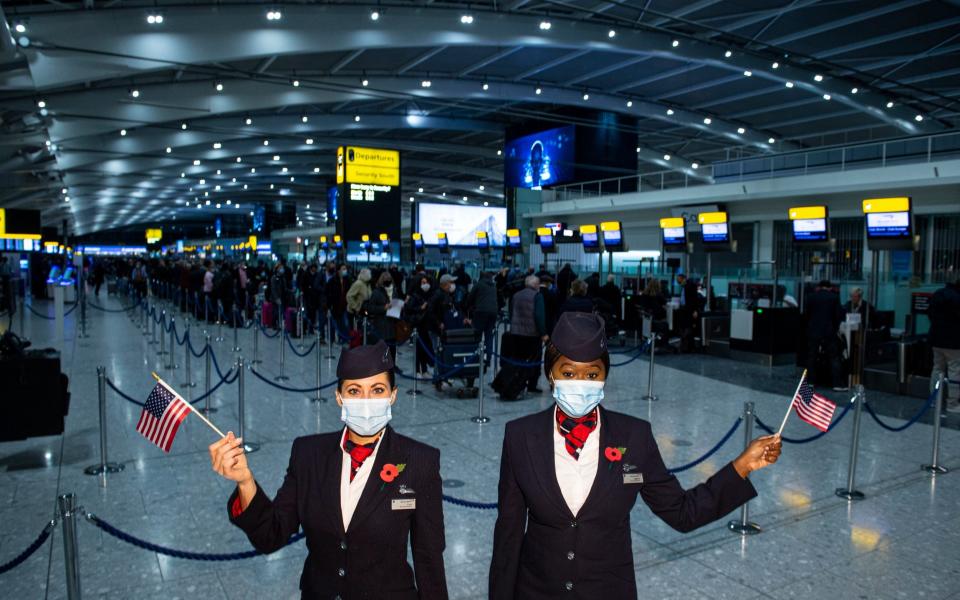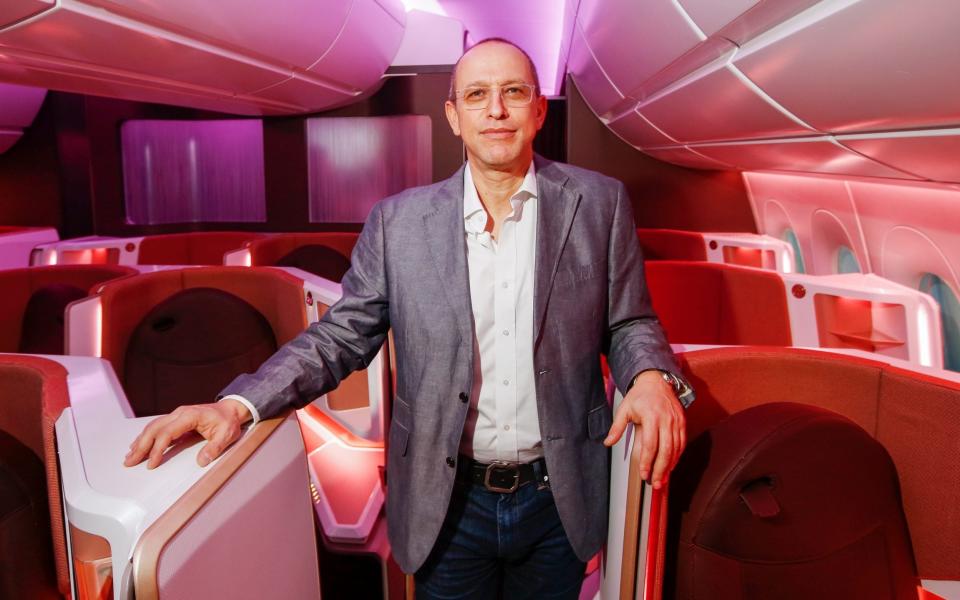Heathrow ‘greed’ under attack from rivals British Airways and Virgin Atlantic

Sir Richard Branson and the former British Airways chief Willie Walsh have set aside their long-running feud to mount a joint attack on the owners of Heathrow, accusing the airport and its shareholders of greed that is damaging the economy.
Writing in the Sunday Telegraph, Mr Walsh, Shai Weiss, the head of Sir Richard’s airline Virgin Atlantic, and the current chief executive of BA’s parent company International Airlines Group (IAG), Luis Gallego, said Heathrow is “back at its old tricks - using its dominant market position to enrich shareholders at the expense of travellers, airlines and the UK’s economy”.
The unprecedented broadside has been sparked by plans to increase passenger charges by more than half in the wake of the pandemic. It brings together the two biggest airlines at Britain’s hub airport, as well as the trade body the International Air Transport Association, where Mr Walsh is now director general.
The group claims that Heathrow’s actions are jeopardising Boris Johnson’s hopes of establishing post-Brexit “Global Britain” as a leader in international trade.
Heathrow is Britain’s biggest cargo port, carrying more freight than Felixstowe and Southampton - the UK’s two biggest shipping ports - combined.
The trio said: “The UK’s Global Britain aspirations rely on cost-efficient infrastructure. Heathrow’s plans to further increase its charges - even at the lower level that the CAA has suggested - put that in jeopardy.”
Documents revealed by The Telegraph in September revealed Heathrow’s plans to increase landing charges by up 90pc from next year. The Civil Aviation Authority (CAA) has subsequently rejected Heathrow’s demands but signalled it is willing to accept increases of up to 56pc.
BA, Virgin Atlantic and IATA said Heathrow’s owners - which include the sovereign wealth funds from Qatar, China and Singapore - must inject billions of pounds into the airport rather than ask passengers to foot the bill for its “extreme use of debt”.
The airport’s gross debts have ballooned to more than £20bn after racking up multi billion-pound losses during the pandemic. It does, however, have cash reserves to last it until February 2023.
Mr Walsh, Mr Weiss and Gallego urged the CAA to reconsider and “end the Heathrow gravy train”, which delivered more than £4bn in dividends to shareholders between 2012 and 2020.
They said: “If the management team cannot find sufficient cost-savings, it’s time to tap its handsomely rewarded shareholders. The story of Heathrow under its current owners is a case study in the extreme use of debt.”
Mr Gallego has warned that the increased landing charges will have to be passed onto passengers.
IAG claims that Heathrow is already 44pc more expensive than its major continental competitors. Mr Gallego has warned that BA will move flights to France, the Netherlands and Germany if Heathrow and the CAA do not back down.
Increased landing charges could have grave consequences for Sir Richard’s hopes of floating Virgin Atlantic to help restore its finances after the pandemic. Michael O’Leary, the outspoken founder of Ryanair, said last month that the listing is “probably f*****” proposals.
The coalition marks a temporary suspension of hostilities between Mr Walsh and Sir Richard, who retains a 51pc stake in the airline he founded in 1984. When Singapore Airlines sold its minority stake in Virgin Atlantic to Delta in 2012, the Irishman declared the end of the transatlantic challenger.
Sir Richard responded by wagering £1m that his airline would still be operating in five years’ time. Mr Walsh changed the bet to a “knee in the groin” because £1m was not significant enough for a “billionaire banker”. Both sides claimed victory in 2017.
A spokesman for Heathrow said: “Heathrow delivers tremendous value for airlines – our world-class facilities enable them to charge premium margins and mean that six of the top 10 most profitable air routes in the world are from Heathrow.
"On top of that, we give them slots for free which they can then sell for up to $75m (£56m) each or use as collateral against loans, value they can’t achieve at any other airport in the world.
"By contrast, our investors have had negative real returns over the last 15 years. The airlines are right to say that the UK’s Global Britain ambitions depend on Heathrow, but wrong to think it can be achieved without a fair return for the investors who will deliver it.”
Heathrow’s greed puts Global Britain in jeopardy
By Willie Walsh, director-general of IATA; Shai Weiss, Virgin Atlantic chief executive; and Luis Gallego, International Airlines Group (IAG) chief executive
Anticipation was high on both sides of the Atlantic this week as the US reopened to vaccinated travellers, over 600 days since the border was closed. Scenes of tearful reunions reminded us that flying really is freedom.
There are no substitutes for a long-awaited hug with a loved one or looking your business partner in the eye. But just as the sector moves into recovery phase, this much-needed boost to British consumers and the industry could be compromised by Heathrow’s greed.
Even before the recovery takes root, Heathrow is back at its old tricks – using its dominant market position to enrich shareholders at the expense of travellers, airlines and the UK’s economy. To make up for revenue lost in the pandemic, the airport asked to increase charges by 90pc from 2022 compared with 2019.
The Civil Aviation Authority (CAA), which as the regulator has a statutory duty to protect consumers from pricing abuse, has already knocked that back to a maximum 50pc increase. But a closer look reveals why the CAA needs to be much tougher.

Heathrow claims poverty, but between 2012 and 2020 more than £4.1bn was taken out of Heathrow in dividend payments. It even paid out £100m in 2020 after the Covid crisis had ground global aviation to a halt and most aviation-related businesses were doing all they could to conserve cash.
Heathrow has been generous to its investors. A £100 investment made in FGP TopCo Ltd (the company at the top of the pyramid of Heathrow’s complex structure of financial entities) in 2012 would have earned nearly £92 in dividends by 2020. That’s a dividend yield of about 10pc annually – more than 2.6 times the dividend yield paid by FTSE 100 companies over the same period.
At its core, the story of Heathrow under its current owners is a case study in the extreme use of debt. The highly leveraged purchase price in 2006 exceeded all market expectations and the addition of debt continues. Heathrow’s ratio of net debt to regulated assets has reached 90.4pc and its overall group debt now stands at a colossal £20.1bn.
As shareholders have enriched themselves through dividends, charges have increased to the highest in the world. Travellers and airlines, however, don’t experience service levels discernibly different from other European hubs even though their bill is 44pc more expensive.

Don’t be fooled when infrastructure providers say that their charges are insignificant. Twenty pence of every pound spent by passengers on travel in Europe before taxes is related to infrastructure, and any hike in Heathrow charges will only make the burden on consumers heavier.
The Government’s Global Britain aspirations rely on cost-efficient infrastructure. Heathrow’s plans to further increase its charges – even at the lower level that the CAA has suggested – put that in jeopardy.
High charges don’t encourage travel. And businesses are always on the lookout for locations with great connectivity at more reasonable costs. Heathrow is the UK’s hub airport and in post-Brexit Britain it’s even more important to connect the UK to the world.
The airport needs to become more efficient, not more costly.
If only Heathrow could be taken at its word. Not long ago it said: “We continue to work closely with airlines on the impact of Covid-19, listening and responding to their needs and priorities for the months and years ahead.”
A 50pc increase in charges just as the sector begins to recover from its biggest crisis ever is not what airlines need, it’s not what the British travelling public need and it’s not what Global Britain needs.

Covid has had a devastating impact on the lives and livelihoods of so many, as well as hurting every player in aviation. But expecting consumers and airlines to pay more in future for revenues the airport lost when the industry was essentially shut down is unacceptable.
Heathrow needs to follow the example of its airline customers who cut 35pc of their costs to survive. And if the management team cannot find sufficient cost-savings, it’s time to tap its handsomely rewarded shareholders. The minimum price for their steady returns in the good times is stepping-up in a crisis.
As Heathrow is clearly not listening, the CAA must step in and take the tough action that is needed. The regulator has a unique opportunity to end the Heathrow gravy train and protect consumers.
Rejecting Heathrow’s proposed increases would force the airport to be more cost efficient and competitive. There is no shame in that. In fact, it would make the UK a more compelling place to do business, benefit holidaymakers and support tourism jobs. A competitive Heathrow would enable our industry to power the Global Britain ambition.

 Yahoo Finance
Yahoo Finance 